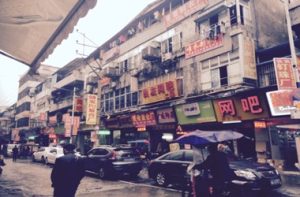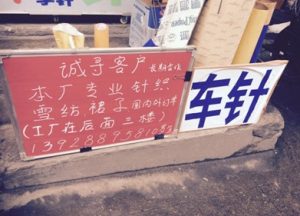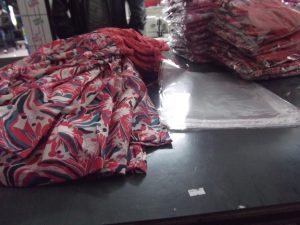As dusk cast dark shadows along the narrow alleyways of Guangzhou’s garment district in the southeast corner of the city, Mrs. Wong packaged the last of the folded garments into flat cellophane bags. She remained silent, despite feeling exhaustion, anger, and resentment toward her husband after another bitter argument had exploded earlier that day. Moments later, she received a phone call from Carmen, a 28-year-old wholesaler whose business the Wongs relied on to keep their small-scale operation afloat. After Mrs. Wong updated Carmen on their progress with the next shipment of little girls’ dresses, Carmen told her that the Thai client had seen a picture of one of the dresses that was not quite ready for shipment. The client had requested a second, last-minute shipment for the next day, pushing the deadline for the original order up by two days. Despite explaining to Carmen that she and the workers were exhausted from working overtime the previous night to meet a prior deadline, Mrs. Wong reluctantly agreed to another sleepless night of labour.
Amidst overlapping conversations among workers on the shop floor, I heard Mrs. Wong informing her husband that she’d agreed to meet their deadline. She then trudged back to her sewing station beside me on the factory floor. I asked her whether there was any way for her to convince Carmen to push the deadline back by one day, so everyone could catch one night of sleep: what difference would one day make?
Mrs. Wong explained that since summer was fast approaching, little girls in Thailand would soon be out of school. Their parents would want their daughters to wear new dresses to play or to go shopping. I was surprised: why did she think that the dresses for little girls in Thailand were more important than a good night’s sleep after long hours of tedious labour? In the tone of a master explaining a basic principle to an apprentice, she said, ‘Sometimes you must understand the position of the other person by putting yourself in their shoes. Our client (Carmen) is getting pressure from her client, so we must do our best to serve her. Plus, we are happy and obligated to help her. When we needed to pay the lease a few weeks back, she asked us if we had enough money. I told her that we didn’t, so she lent us the RMB 10,000 we needed to keep our business going.’
I was taken aback to learn about Carmen’s financial assistance to the Wongs. Over the course of my two-year ethnographic research at the migrant couple’s household workshop (they were originally from the city of Guigang in the neighboring Guangxi province), I had observed the budding of Mrs. Wong and Carmen’s fictive mother-daughter friendship, which blurred the divisions between boss and employee. From 2010 to 2012, I worked alongside Mr. and Mrs. Wong so that I could observe the everyday challenges and rewards of small-scale entrepreneurship in Guangzhou’s fast fashion sector. Some of these challenges included unpredictable market declines, long working hours, demanding clients, exploitative working conditions, unyielding competition, and bankruptcy. Since the start of the COVID-19 pandemic and the ensuing economic downturn that unfolded, these challenges made migrant entrepreneurs more vulnerable to pressure to take on whatever production orders were on offer, including those that were only marginally profitable. As I helped to cut loose threads off assembled garments and package them for delivery, I had the opportunity to closely observe and interact with clients, itinerant migrant workers, and the Wongs themselves. Through participant observation, I documented the daily rhythms and everyday struggles of migrant self-enterprise in Guangzhou’s fast-fashion sector.
In the larger context of low-cost fast-fashion production and transnational subcontracting in China, the risk of financial loss, including debt and bankruptcy, was an everyday reality for migrant entrepreneurs like the Wongs. Even before the COVID-19 pandemic, many migrant entrepreneurs like the Wongs had to informally subcontract from self-employed market intermediaries like Carmen, who received production orders from multinational corporations and big box retailer chains.
Conditions for migrant entrepreneurs like the Wongs have become even more precarious since the outbreak of the COVID-19 pandemic. Because large fast-fashion corporations usually do not directly own or operate any factories or warehouses, small-scale subcontractors shoulder the risks of surplus inventories, capital flight, labour strikes, and falling margins, and do so without socio-economic safety nets. Risks are passed down the supply chains to local manufacturers who then hire migrant labourers at piece-rate wages. This hierarchical chain of command and risk deferment makes low-cost garment production even more vulnerable to exploitation, with the blurring of profit-seeking business activities with fictive kinship and opportunistic intimacy.

A typical afternoon in one of Guangzhou’s urban villages 城中村 (rural neighbourhoods in the outskirts or sometimes in the middle of urban centres), where the supply chains for the global mass manufacture of low-cost garments are situated. The Wong’s factory was located around the corner from this street. Photo by author.
When I first visited the Wong’s factory, it was situated in the middle of a long row of densely built apartment buildings along an alleyway in one of Guangzhou’s urban villages. Like many small-scale household workshops or jiagongchang 家工厂in the surrounding garment district, it was hidden and informal. (Since then the Wongs have moved out of the garment district, and have set up another factory elsewhere in the city.) Using low-tech, second-hand industrial irons, cutters, and sewing stations, the migrant couple depended on their personal savings and their experiences as employees of larger garment factories in Shenzhen for financial and social capital. In the early years of their factory, which they started in 2012, the Wongs relied on walk-in clients and temporary migrant workers to kick-start their business. Most clients would drop off an order of about 500-1,000 garment pieces per order, while temporary migrant workers would earn piece-rate wages for a week at a time before venturing off to other jobs.

A sign posted in the urban village. A garment factory is seeking long-term clients. The factory specialises in manufacturing knits, chiffon, and dresses. Photo by author.
Like many similar household workshops in the area, the Wongs’ workshop drew upon the family as its basis of organisational support, which served as a buffer from the exploitative effects of industrial labour. The Wongs followed in the footsteps of Mr. Wong’s older brother, who operated a similar workshop nearby. On days when his business was slow, Mr. Wong’s brother would stop by and assist in the ironing or packaging of garments. While using the family (nuclear or extended) as the foundational source of labour and emotional support, the workshop, lacked the long-term stability conventionally associated with kinship.
In this garment district, production orders are often short-term and unpredictable, as is the supply of labour, with many migrant workers preferring temporary work before venturing out to find other jobs or to run their own businesses. Thus, the defining characteristics of this household workshop are short-term fictive-kin relations that blur the boundaries between trust and exploitation to make rapid cycles of fast fashion production work.
Scholars and observers of small-scale household workshops have shown how there is no clear line between the public and private or formal and informal.[1] Their works emphasise how production is cyclical and reliant on social and familial connections rather than formal institutions.[2] My investigations into small-scale household workshops in Guangzhou demonstrate how low-cost garment mass manufacturing also draws upon short-term, precarious, and fictive kin-based relations, which can obscure relations of inequality and exploitation between clients and their subcontractor/ manufacturers.
The relationship between Mrs. Wong and Carmen, for example, demonstrates how sentiments of care, love, and trust can sometimes hide the exploitative effects of fast fashion production. A fledging wholesaler in Guangzhou’s garment sector, Carmen had forfeited her studies at a university in Australia to take over her mother’s garment wholesale business in Guangzhou after her mother’s sudden illness and death, expanding the family business in her mother’s name. As Carmen was struggling to jumpstart her wholesale operations, Mr. and Mrs. Wong were establishing their factory in Guangzhou’s urban village. When Carmen met the Wongs, she and Mrs. Wong bonded over the loss of Carmen’s mother. Her feelings of void and sadness struck a chord with Mrs. Wong’s long-standing desire for a daughter.
Mrs. Wong and Carmen provided crucial assistance to one another as they launched their respective businesses. They shared information on the costs of fabrics and other raw materials, as well as on rental spaces in wholesale markets across the city. Carmen and Mrs. Wong also shared intimate details about their families, calling each other several times a day to chat about the difficulties of marriage, motherhood, and entrepreneurship. The boundaries between care and industrial labour, as well as between boss and employee, became blurred and ambivalent, shifting the dynamics of power between the independent subcontractors in ambiguous and unpredictable ways.
As Mrs. Wong prepared herself for another long night of tedious labour, she described her friendship with Carmen with such compassion and respect that I missed the uneven power dynamics that coloured their boss-client relationship. I went along with Mrs. Wong’s rationale about the ethics of a good manufacturer in understanding the pressures their clients faced. I attributed this to guanxi关系, of maintaining informal personal and business relations marked by reciprocity and mutual obligation. Once I mentioned the term guanxi, Mrs. Wong enthusiastically confirmed that I had correctly understood her characterisation of the friendship by saying, ‘Yes, that’s right. Sometimes many things in life are about guanxi. If she and I didn’t have such a good relationship, I might not be doing this for her.’ The Wong’s decision to fulfill Carmen’s last-minute request at the expense of rest came from their desire to maintain their guanxi with Carmen as both a family friend and as a client. The bonds of exploitation, obligation, and sacrifice between Carmen and the Wongs were tightly enmeshed, blurring the boundaries that separate boss/employee, care work/productive labour, and commodified/ non-commodified work. Their collaboration as independent contractors in the volatile and unpredictable world of fast fashion emerged not only from a shared interest in profits, but also from their fictive, but felt, mother-daughter bond.
Later in the week, when I had a chance to speak with Carmen privately over dinner, she and I shared our appreciation for the Wongs. I talked about the enormous sacrifices that the Wongs had made by living and working in the factory day in and day out. Impressed by the displays of modesty and pride, which the Wongs had shown through their hard work, Carmen and her business partner responded, ‘You know, we have met numerous factory owners around here, and it’s quite easy to find hard working people. But the Wongs are exceptional because we can rely on them. Once we place an order, we know that they will do the best they can to complete it. They do what they say they’ll do. That’s why we trust them.’ Carmen’s decision to provide financial assistance to the Wongs stemmed from her reliance on the couple as both her friends and as business partners.
Months later, Mrs. Wong once again had a difficult time finishing a last-minute production order for one of Carmen’s clients. She had to re-tag the labels from several hundred little girls’ dresses, which required slow and meticulous work. This led her to vent her frustration on her workers. Afterwards, she reflected on her relationship with Carmen as I accompanied her into the kitchen to wash the dishes and vegetables in preparation for dinner. I acknowledged the pressures she was under, including balancing factory work with household labour. She mentioned how one of the women she’d snapped at told her later that she couldn’t sleep that night because of Mrs. Wong’s harsh tone; Mrs. Wong told the woman, whom she called ‘little sister’, that she’d just been venting, and had already forgotten about it.
She said that Carmen would sometimes speak to her in similarly harsh tones. Earlier that week, Mrs. Wong had called Carmen to clarify the proper position of the buttons on an order for girls’ dresses: ‘Carmen snapped at me by saying that she had left the precise measurements with us in one of her notebooks. She said rather bluntly she was busy and couldn’t be bothered with such minor details.’ Carmen promptly called Mrs. Wong again to apologise. Mrs. Wong said she understood Carmen was busy, and she hadn’t taken it to heart. ‘I don’t really care about these things,’ Mrs Wong told me. ‘I simply forget it the next day. I understand that’s how you must be in the business world. I don’t care. I only care about raising my sons and providing them with a good life. That’s all I care about.
Even though Mrs. Wong mentally compartmentalised the business world from other aspects of her family life, her reflections on proper conduct as an entrepreneur reflected her moral disposition and sense of human decency 做人. Echoing her earlier comments about honesty and trust-building, she maintained a clear sense of the importance of moral and ethical conduct in the business world. Balancing multiple roles as a mother, wife, factory owner, and garment worker, she had to strike a balance between her struggles as a migrant entrepreneur and her other roles in the larger world.
Years later, I would learn that her friendship with Carmen could not survive the economic pressures of small-scale entrepreneurship. The Wongs eventually ended their collaboration with Carmen after an elaborate plan to co-invest in a new factory space in the Wongs’ hometown of Guigang. The initial investment in the factory was provided by Carmen. At the time, Carmen was running her own business and had partnered with a man from Dongguan in Guangdong who was about her age. I had seen the two deliver orders and arrange materials in the Wong’s factory several times. I had even had dinners with them years ago. Their business partnership became a romantic one, but after a few years, the relationship ended and they went their separate ways.
Later, Carmen met another romantic partner, this one from Hubei province. Much like the Dongguan man, her new boyfriend collaborated in her business ventures. According to Mrs. Wong, Carmen’s new boyfriend was more assertive in business. Seeing how well she got along with the Wongs, he convinced Carmen to send her production orders to a new factory he had opened in Hubei; he preferred all profits to remain within their joint partnership. This effectively severed Carmen’s business ties with the Wongs.
Mrs. Wong’s story led me to realise the significant role romantic partnerships could play in these small-scale subcontracting partnerships. I was surprised by the extent to which Carmen’s romantic partnerships influenced her business decisions. Migrants (like other businesspeople) often mixed business partnerships with marriage and romantic ties. But their status as rural migrants left them with fewer rights to state welfare and residency protection than city residents. These limitations compelled migrants to become dependent on informal business partnerships and patron-client relationships, which often seeped into the realms of romance and fictive kinship. While the Wongs struggled with their marriage in the context of running the factory, other migrant entrepreneurs in the wholesaling sector broke off their marriages and romantic partnerships in face of financial stress: where love and marriage played a central role in business partnerships they were badly affected by problems in the business.
I was also surprised that Mrs. Wong held little anger or resentment toward Carmen for backing out of the business plan, even though the factory space in the Wongs’ home in Guigang continued to sit idle. The Wongs acknowledged that the in Guangzhou would be eventually dismantled after the municipal government incorporated the area into the urban core and enforced the hukou (household registration) system there. The demolition of factories and warehouses would force many migrant businesses, including theirs, to close. It seemed the Wongs interpreted professional separation from Carmen as simply another part of doing business. Although I knew them for years, I was not sure whether Mrs. Wong saw it as a missed opportunity or as an act of fate.
Besides, the couple hoped to collaborate with Carmen again someday. Mrs. Wong informed me they occasionally communicated over WeChat. Carmen once invited Mr. Wong to visit her new factory in Dongguan. According to Mrs. Wong, Carmen had even tried to persuade Mr. Wong to give up their factory to work at hers. Although Carmen had broached this with the Wongs several times, the couple had not taken the possibility seriously. It did not seem to be a fair trade-off for the factory expansion and investment opportunity they had originally envisioned with her. I was not sure whether Carmen’s offer was an attempt at reconciliation or whether she saw the offer as beneficial for everyone involved.
The Wongs, by contrast, wanted to maintain some control over their labour and livelihood, however difficult. The years of struggling with the challenges of migrant entrepreneurship, from labour sub-contracting to negotiating the transnational supply chains of fast fashion, taught them that they needed to strike a balance between exploiting others and avoiding being exploited themselves. Looking back, they realised this was hardest when client-manufacturer relations blurred boundaries of kinship, entrepreneurship, and industrial labour.
Notes
[1] Hsiung, Ping-Chun. Living Rooms as Factories: Class, Gender, and the Satellite Factory System in Taiwan. Temple University Press, 1996; Narotzky, Susana and Gavin Smith. Immediate Struggles: People, Power, and Place in Rural Spain. University of California Press, 2006; Yanagisako, Syliva. Producing Culture and Capital: Family Firms in Italy. Durham: Duke University Press, 2002.
[2] Elyachar, Julia. Markets of Dispossession: NGOs, Economic Development, and the State in Cairo. Duke University Press, 2007.



